Lowell House Opera mounts Tchaikovsky’s ‘Eugene Onegin’ :
‘Hey kids, let’s put on a show – in Russian’
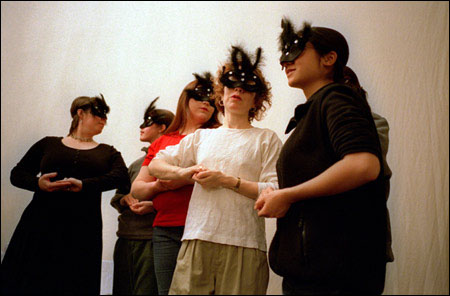
At one end of Lowell House’s stately dining room, as servers clear away the last vestiges of the night’s meal, students are still arriving, shedding coats and changing shoes and studying musical scores. Beneath a truss hung with theatrical lights that surrounds the room’s awe-inspiring chandelier, they assemble on a plywood platform stage.
They’re the cast members of Lowell House Opera’s production of Tchaikovsky’s “Eugene Onegin.” One week before the show opens for its eight-night run (March 5-15), it’s “Hey kids, let’s put on a show,” Harvard-style, as enthusiasm and ingenuity meet a whopping dose of professionalism and overachieving.
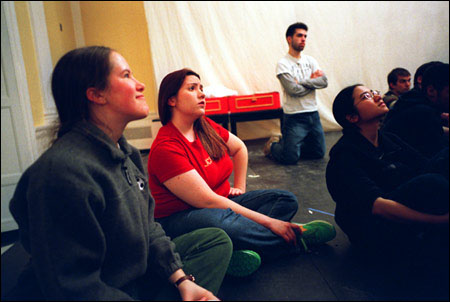
After all, opera is a demanding art, equal parts sound and spectacle. Not only must the performers in “Eugene Onegin” sing their parts – in Russian, no less – they must also learn to act, dance, and, in one case, do some magic tricks.
And like all musical performance at Harvard, “Eugene Onegin” is completely extracurricular, squeezed around students’ academics and other activities.
“It’s a conservatory-level production that’s held in a university that has no conservatory,” says Anne Harley, a professional singer who is this production’s stage director and a member of the Lowell House Senior Common Room.
Still, more than half the 140 cast, crew, and orchestra members – including many of the leads – are current Harvard students; alumni and other University affiliates make up about another quarter, with the remaining participants drawn from Boston’s legions of young musicians eager for experience.

Multitalented multitaskers
Based on the poem by Alexander Pushkin, “Eugene Onegin” is set in 19th century St. Petersburg. Onegin is a worldly but jaded gentleman who captures the love of Tatiana, a young, shy provincial. He rejects her adoration and she marries his cousin, Prince Gremin. Remorse, loneliness, and unrequited and unfulfilled love ensue – it’s Russian, after all, and an opera to boot. English supertitles projected on a screen above the stage ensure that audience members don’t miss a word of the story.
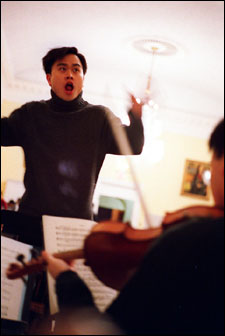
Music director Channing Yu ’93 has chosen to remain faithful to Tchaikovsky’s musical vision. “I think the way Tchaikovsky is performed, a lot of times people exaggerate things a lot and it takes on a sentimentality that I’m not really sure he intended,” says Yu, an accomplished pianist.
Yu and Filbert Hong ’94, executive producer and orchestra manager, set the standard for the production’s many multitalented multitaskers. Both men are resident tutors in Lowell House and both are students at Harvard Medical School, where Hong is pursuing the Ph.D. in biophysics and Yu is in his final year of the M.D./Ph.D. program (“My schedule’s a little lighter now that I’m in my last year,” he claims).
At the rehearsal, Yu and Hong play musical musical chairs: Yu starts at the piano, steps to the conductor’s platform when a rehearsal pianist shows up, and sings Tatiana’s part in a love duet because the real Tatiana – New England Conservatory student Leah Florence – is late with a flat tire. Hong accompanies on violin and later, a cellist joins in. The versatility they showcase, they say, permeates the cast and crew.
Hong, a violinist and violist, has played in nearly 400 Harvard concerts since he came to the University. “He is one of the best-kept secrets of Harvard’s music scene,” says Yu, crediting Hong for assembling and managing a top-notch orchestra of talented, enthusiastic students and off-campus musicians.
“Eugene Onegin” marks Yu’s opera directing debut, but he commands the baton like a pro. He’s the founder and director of the Lowell House Last-Minute Orchestra, which performs orchestral works after just two afternoons of rehearsal. “The expectations are slightly different,” he says of that seat-of-the-pants ensemble. “There’s a level of excitement and a little bit of danger.”
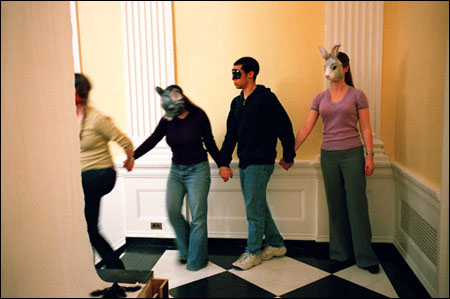
Danger and excitement
As opening night looms large, excitement and danger linger around the Lowell House Dining Hall during this rehearsal.
Lighting designer Alison Cherry ’04 watches the action from a nearby table, scribbling notes. “I’m seeing this for the first time just now,” says the busy technician who’s lit many Harvard productions and hopes to make lighting design her career. The nontraditional stage space, she says, makes her job a challenge.
“It’s a great opera, it’s great for the house, it’s great for the audience. But it’s a constant struggle for me,” she says.
Onstage, actors practice a ballroom dancing scene as stage director Harley counts out musical cues and barks out reminders: “Masks on!” then, “Masks are off now!”
As Triquet, a mysterious Frenchman who joins the ball, Michael Moss ’03 leads the cast and crew into hysterical laughter when his onstage magic tricks fail miserably.
“We’re creating this multimedia work of art from scratch,” says Yu, who brings confidence and serenity to the scene.
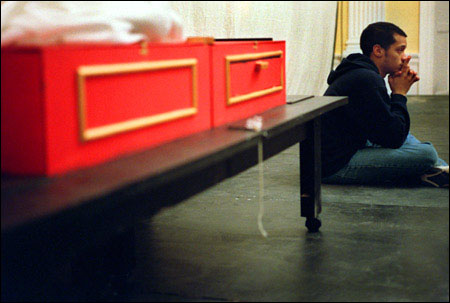
Learning from each other
The essential challenge of any student performance – balancing learning opportunities with the quest for a polished finished product – clearly excites Yu.
“It’s such a great way for students to … gain an appreciation of what it takes to put together an opera,” he says. And while some of the less experienced musicians may need extra musical attention, they bring other strengths.
Cast member Gena Ciccone ’04, who plays Tatiana’s mother, Madame Larina, may be an opera neophyte, but the Russian studies concentrator has used her Russian language expertise to coach the other singers. While her true passion is in musical theater, she auditioned for “Eugene Onegin” because she didn’t want to pass up an opportunity to sing in Russian.
“Learning to sing opera has certainly been a challenge, but everyone’s been so helpful,” she says. “The whole style of singing is so different from musical theater. In opera, it’s much more about making sure every note you sing is really beautiful.”
John Errington ’05, who plays Prince Gremin in his opera debut, has spent considerable energy learning to act as well as sing, which he’s done seriously for four years. “Acting is a concern more to the forefront than I had earlier thought,” he says. “It makes it so much more interesting, so much more engaging.”
Onstage, after repeated coaching from professional singer Adriane Shelton, who plays Tatiana’s nurse, Filipyevna, the performers finally nail the ballroom scene after several raggedy endings. Yu beams from the podium.
“What’s been really interesting for me to watch is that everyone learns from each other, no matter what their level of musicianship,” he says. “That’s what makes it extra exciting. We’re still seeing amazing things.”




